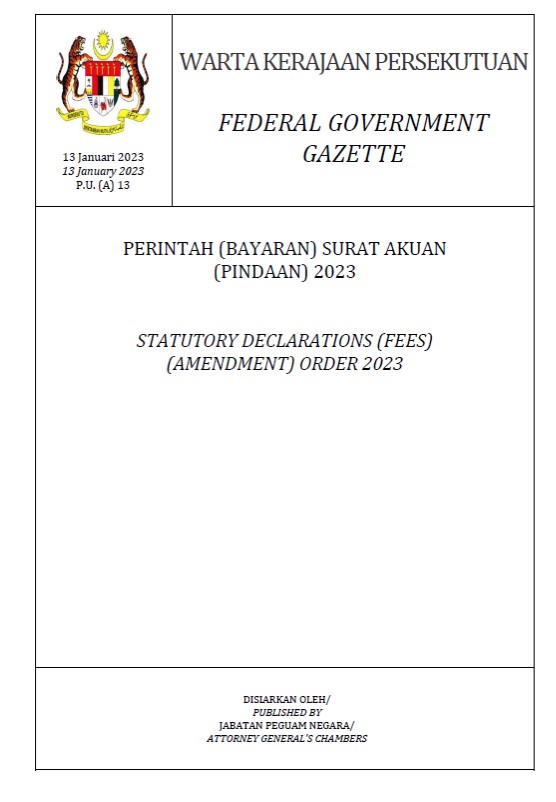mengendalikan akuan sumpah, mengambil dan menerima Akuan Berkanun, mengambil apa2 affidavit, ikrar, sumpah Wasi-Wasi dan Pentadbir harta pusaka, sumpah orang-orang dalam apa-apa tindakan, perkara atau prosiding yang menunggu penyelesaian atau hampir hendak dimulakan dalam mana-mana Mahkamah - Mahkamah Civil dan Syari'ah.
Wednesday, 10 January 2024
Thursday, 7 December 2023
CARA MUDAH UNTUK DAPATKAN NOTARI AWAM DI TEMPAT BERDEKATAN DENGAN ANDA
Sangat Mudah ! Tidak perlu Log In, tetapi boleh buat carian Notari Awam yang berdekatan dengan Tempat Kerja atau Kediaman anda berdasarkan kepada carian Negeri dan Bandar :
Sunday, 24 September 2023
Wednesday, 7 June 2023
SAMBUNG BAYAR KERETA YANG MASIH DALAM PINJAMAN DENGAN BANK
It’s well known that vehicle pawning, or sambung bayar, in which someone pays monthly instalments to “own” a vehicle that legally does not belong to them, has been around for a long while. It’s usually employed as a way out for vehicle owners unable to pay their monthly instalments to the bank, with payment for the car being continued by a new guardian of the vehicle, who effectively leases the vehicle without owning it.
Sounds simple enough, but in practice there have been enough cases where the contract hasn’t ended in pleasant fashion, either for the owner or the “buyer.” More importantly, the very act of pawning a vehicle is illegal.
This was reiterated by the ministry of domestic trade and cost of living’s (KPDN) director-general of enforcement, Datuk Azman Adam, who reminded the public that any contract signed for the purpose of continuing vehicle payments under a sambung bayar scheme is not legally valid, Sinar Harian reports.
He said that under the hire purchase agreement signed between the owner (in this case, bank or financial institution from which the HP loan was secured) and the lessee, there is a condition that states the lessee cannot ‘sell’ the vehicle without the owner’s permission. Doing otherwise is an offense to defraud the owner under the Hire Purchase Act 1967.
Azman said that this did not mean that someone else cannot pay for the vehicle and use it, as an assignment of rights under a hire purchase agreement is permitted under Section 12 of the Hire Purchase Act 1967. However, it can only be carried out with the bank/financial institution’s permission.
In such cases, if the lessee intends to hand over his rights over the vehicle under the HP agreement, the lessee must inform the bank/financial institution of his intention and seek to obtain the bank’s permission and approval.
“If the bank agrees, the hire purchase agreement in the name of the lessee will not be terminated, but a new ‘assignment’ document will be prepared by the bank, and this will be signed by the original lessee, the bank as well as the party continuing payment for the vehicle, under the condition that the party continuing the payment is not on the blacklist of financial institutions. The rights and liabilities of the original lessee will continue to be in effect throughout the assignment period,” he said.
However, Azman said this was not the case with the majority of sambung bayar cases, with the activity happening outside the knowledge of the bank. In such scenarios, the lessee negotiates directly with the pay-as-you-go party about his intention to ‘sell’ the vehicle that is still subject to a hire purchase agreement.
“The pay-as-you-go party only needs to provide a small advance payment and continue the monthly installment payment to the bank on behalf of the lessee. Normally, the agreement between the lessee and the new party will be signed via a written contract or sometimes, just by a handshake,” he explained.
He said such cases continue to propagate because it was an easy way out for both sides – lessees unable to pay the monthly installments have a quick solution to continue payment, while those carrying out the sambung bayar process are usually those facing difficulties in obtaining vehicle loans or are blacklisted by financial institutions. Furthermore, the easy process of securing a vehicle and not having to put down a large chunk of money for it makes it tempting for those looking for an easy deal.
Azman said that while it is difficult for financial institutions to track the vehicle if the pay-as-you-go party fails to pay the vehicle’s monthly installments, the lessee is the one that will bear the burden of such behaviour, including legal action and being blacklisted.
“In addition, a lessee who is found to have sold his vehicle while the hire purchase agreement is still in place could be sentenced to a fine of up to RM30,000 or three years in jail, or both, under Section 38 of the Hire Purchase Act 1967,” he said, adding that lessees also run the risk of receiving a summons for traffic offences that he didn’t commit. As for those continuing the loan, the car isn’t yours, and it never will be.
Like it has been in the past, our advice to those thinking of pawning their vehicles or “owning” a fancy ride under a sambung bayar scheme remains the same – don’t do it. It’s illegal and not worth the hassle, even if it sounds like an easy snip at first glance.
Baca Lanjut di pautan ini :
Akuan Berkanun - Sambung Bayar Kereta Masih Dalam Pinjaman dengan Bank








